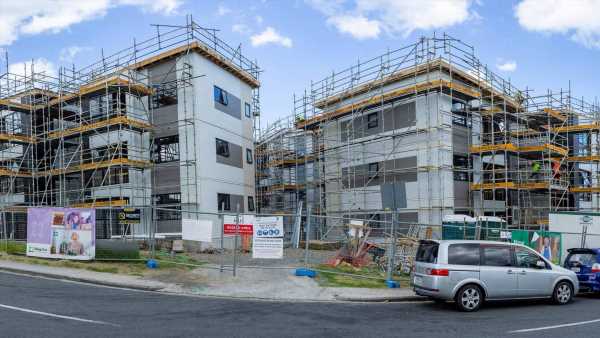Kāinga Ora’s $2.5m blowout, delay to Te Atatu Auckland apartments where builder failed
State homeowner and developer Kāinga Ora Homes and Communities will suffer a $2.5 million cost rise and a seven-month delay on a west Auckland apartment project, abandoned by a foreign modular housing business being liquidated.
Instead of it costing $8.3m to finish the off-site manufactured project by an Australian business at the 21-unit Kervil Ave, Te Atatu site, it will now cost $10.8m, an official says.
Instead of it being finished by last October, it now isn’t expected to be done until May.
Kāinga Ora programme delivery director Nick Seymour disclosed that and described a number of problems at the unfinished multi-level development, delayed by seven months.
The state entity owns about 60,000 homes, but nearly 25,000 people are seeking accommodation, so it is under pressure to build, buy and rent thousands more apartments and units in Auckland.
The liquidation, pandemic, issues getting materials to the site and price rises had all dogged the development left unfinished by the failed Australian Integrated Modular Build.
Kāinga Ora is not filing a claim with the liquidators of the builder which failed, Seymour said.
“Due to that liquidation and the impact of Covid on global supply chains, the ability to get onsite and construct and the labour market, the project will not now be complete until around May this year when it was due to be finished in October 2021.
“Due to Covid and rising materials prices, it will now cost approximately $2.5m more than the original price of $8.3m,” Seymour said today.
The Herald reported how the site was abandoned for months last year.
The situation has left local industry experts astonished that the Government agency had ever chosen a foreign business over New Zealanders, questioning why it’s going modular when around 97 per cent of homes here are not built like that, and saddened at the failure.
The Government agency has now picked a Vietnamese modular housebuilder for a Northcote job neighbouring the Australian’s failure.
Integrated won $20m of Government state housing agency contracts for 50 new apartments but is forecast to have a $1.6m deficit. Construction sector experts said it had left sites in sorry states with unfinished buildings, open to the elements, being damaged.
Liquidator Craig Young, of Restructuring Services, said the company had stopped trading because it was unable to incur continuing costs.
A $1.6m shortfall is forecast: unsecured creditors are owed $1.9m but the company only has assets of around $258,000. Young cited Kāinga Ora, saying creditors were here and in Australia. Supplies came from there.
But Kāinga Ora is sticking by its decision to go modular and foreign.
“Offsite manufacturing is playing an increasingly important role in New Zealand construction as it has successfully done overseas,” Seymour said today, also defending importing overseas places.
In a repeat situation, Vietnamese are contracted to deliver new state homes at another site.
Ho Chi Minh-headquartered TLC Modular, partly owned by Goldman Sachs, has now been contracted to import 182 fully-built-up housing units on four ships arriving this winter from Vietnam and stack places on top of each other on the corner of Lake Rd and Fraser Ave, Northcote.
Shane Brealey, of private development business NZ Living, which has built a 102-home Fraser Ave project at Northcote 18 months ago, is sceptical about the state agency’s modular moves.
“We built that in a little over 14 months: one new home for every 2.7 working days using on-site production techniques. Why anyone would want to take the higher risk, higher cost and lesser quality of off-site manufacturing solutions is beyond me,” Brealey said of the TLC modular method.
In his view, a much higher risk than is needed is being taken via the Vietnamese units and KO has already been burnt once at Northcote, he recalled.
Seymour said the state agency had a new contractor on the Te Atatu site.
Miles Construction was finishing the apartments, he said. Miles had also worked with Integrated.
Around 24,546 people are waiting for state housing accommodation, registered for assistance. The Ministry of Social Development said in September that was up 14.6 per cent annually.
Meanwhile, Helen O’Sullivan has resigned from the Kāinga Ora board not long after joining, saying nothing is wrong and she did that for good reasons.
The dynamic, popular, highly skilled O’Sullivan has a high-profile property career, currently chief executive of property business Crockers, but with a wealth of experience across a wide range of the sector.
She is a former chief executive of the Real Estate Institute and of Ockham Residential, which co-founder Mark Todd says has $650m of development on currently.
O’Sullivan was only appointed to the main board last February. Asked if there were any issues that caused her to resign in less than a year, she said via text: “Not so. I was on the investment and delivery committee prior to the full board, from about March 2020.”
She has joined the board of a smaller, private business, Kiwisaver provider Simplicity Living headed by Sam Stubbs, with has itself formed a new venture with Brealey’s NZ Living to develop affordable homes.
That new venture plans 10,000 affordable homes worth $5b in the next decade.
“I’ve chosen the role with Simplicity Living because it’s where I think I can have the most impact in the cause of affordable, secure tenure housing.”
Asked what achievements she could list in her few months on the main board, she said: “I’d prefer not to comment.”
Housing Minister Megan Wood also said O’Sullivan had left the state entity’s board because she was joining the private business’s board.
“She cited a conflict of interest with joining the board of Simplicity Living,” a spokesperson for the minister said.
Source: Read Full Article


/cloudfront-ap-southeast-2.images.arcpublishing.com/nzme/QUSZLTE4S46UDM3AJYOBWDN6VM.jpg)
/cloudfront-ap-southeast-2.images.arcpublishing.com/nzme/N7I4F572W7ZINXERALCBZKSDO4.jpg)

